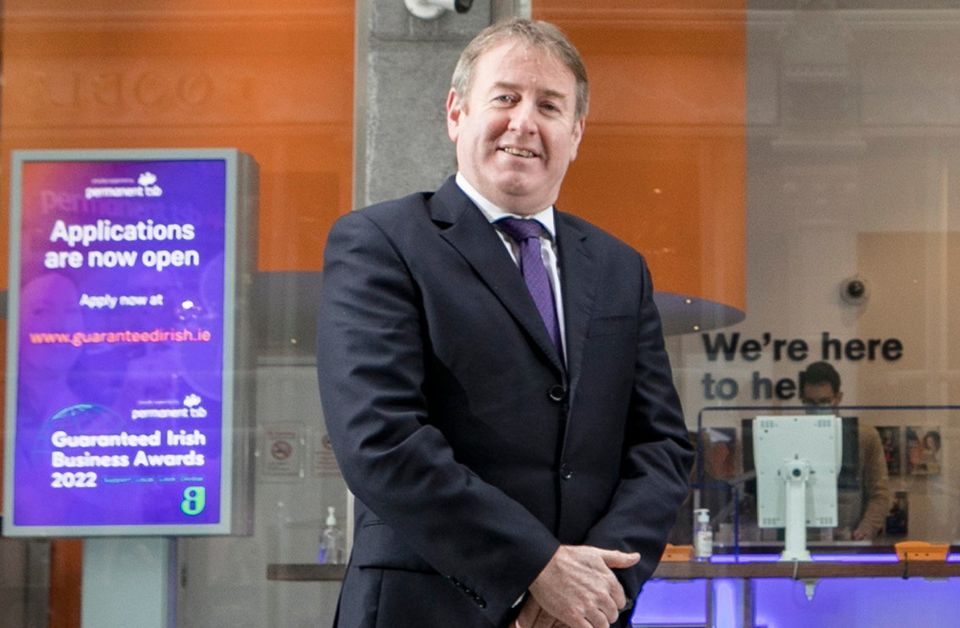Since taking the top job at PTSB in 2020, Eamonn Crowley has had much work to do – but right now he’s full of ambitious plans for the country’s third banking pillar
The 55-year-old chief executive of PTSB, formerly Permanent TSB, took over the top job back in 2020 and has since steered Ireland’s third-largest bank into what looks set to be a new, more profitable era.
But before it entered this profitable era, the bank posted two consecutive losses, reflecting the bumpy journey it has been on since the financial crash. Crowley says the bank, which is majority state-owned after being bailed out during the crash, has been transformed by acquiring Ulster Bank’s retail, SME and asset-finance businesses in the Republic, worth about €6.75bn.
With PTSB’s loan book growing by around 50pc post-deal, Crowley feels the bank has the scale to pursue a much broader range of business. Alongside its sponsorships of the Ireland Olympic and Paralympic teams, PTSB has a newfound confidence, he says.
‘What we ask for from business customers is to give us a chance. To actually come and talk to us’
“We have a platform now in which to do more business with more customers, in a way that positions us much stronger than before the [Ulster Bank] transaction. It was transformational.
“If one tracks our own history coming out of the crisis – the challenges that the bank had at that stage and all the challenges we had from 2012 up until 2020 – it is great to see that we can now focus our attention on customers, on competing, on improving our digital app.
“If we go back to when I started seven years ago [as chief financial officer], we were focused more on how we managed our balance sheet, how we managed capital, our positioning in the market, how we got through those more difficult times.”
Eamonn Crowley in the PTSB boardroom. Photo: Frank McGrath
The Ulster Bank deal may have benefited PTSB. However, the surge in interest rates at the European Central Bank since 2022 has also helped to bolster the bank’s net interest margin (the difference between the interest rate a bank charges borrowers and how much it pays savers).
As with the two other main Irish banks, profits have soared as a result.
According to its annual results, the bank recorded a profit before tax of €79m for 2023, enhanced by its net interest income (NII) increasing 71pc. In 2021, while interest rates were low, the bank recorded a loss before tax of €21m.
Last month, PTSB released a quarterly update, saying that NII had risen by 10pc in the first three months of the year compared to the same period in 2023. Customer deposits also stood at €23.3bn at the end of March, up €1bn since last year.
Despite PTSB’s market share of mortgage drawdowns falling to 13.4pc in the first three months of the year – driven by a slowdown in the switcher market – Crowley seems pleased with the bank’s performance.
“From where we have come from, I am extremely happy,” says Crowley. “Can we do more? We can. Have we been investing in the business? We have. And some of that investment cost is coming through as well.
“Is the market competitive? Yes. Do we have to compete? We do. Do we see a clear path toward further profitability? We do. But that has to be thought about over a couple of years, rather than just in the short-term.”
Now Crowley plans to use PTSB’s post-deal clout to grow the bank further – especially among Ireland’s SMEs.
Crowley has ambitions to gain 10pc of the new business lending market in Ireland, which for SMEs was worth around €4.1bn in total last year. PTSB is also offering an asset-finance product.
The bank has grown its business book from around €100m three years ago to €1bn, thanks mainly to the Ulster Bank deal. Crowley hopes PTSB can now win more business ahead of its much larger rivals at Bank of Ireland and AIB, who dominate Irish business lending.
“What we ask for from business customers is to give us a chance,” he says. “To actually come and talk to us if they are looking at taking new lending or new activity. We tend to be much faster by way of a yes.
“Why?” he muses. “We are building a business. We are focused on customers in that respect, and we want to compete and we want to grow. The way we grow is if people give us a chance.”
‘We believe the switcher market itself will come back’
But businesses have been reluctant to take on debt, with memories of the financial crash still raw. Indeed, the €4.1bn figure that was loaned to SMEs last year represented a €174m annual decrease. Crowley acknowledges that the overall market for business lending was down last year. However, he says, PTSB’s figure for new lending grew, albeit from a low base.
“We are still seeing a reluctance, but we are coming from a different place,” he says. “We want to grow, we want to compete, we want to talk to customers. In that sense, we believe we can grow even if the market itself is somewhat contracting.
“At a more global, ‘Irish Inc’ point of view, we do need SMEs and Irish business to invest. We need that sentiment to move somewhat.”
The vast majority of PTSB’s lending activity relates to the mortgage market. Last year, PTSB had new lending of €2.8bn, over 82pc of which was mortgages.
Crowley says competition in the mortgage market is heating up. Last month, PTSB cut its rates by up to 1pc in an effort to attract more business.
“We are seeing a fairly significant increase in applications. We believe the switcher market itself will come back. We are here to compete in that and offer customers something that is attractive in that regard.”
Crowley is focused on competing – but PTSB’s turbulent past is hampering its ability to do so effectively against its much larger rivals in the mortgage space.
Every €100 of mortgages the bank issues has a risk weighting of over 40pc, against which it must hold expensive capital. The high risk-weighted assets (RWA) density is a result of the bank’s past, when 28pc of its mortgages were non-performing. The risk weighting on new Bank of Ireland and AIB mortgages is in the 20s.
Crowley says PTSB is now working to update its experience to reflect the last seven years of performance, which he says has a low loss history. He plans to present that to regulators next year.
“The production of this is on us,” he says. “What we would expect – based on the experience over the last seven years, with our loss history being much lower than the previous seven – we would expect our risk weights to reduce based on that alone.
“But we have to prepare that, test it and present it. And engage with the regulator.
‘Competitors in the past have come and gone’
“Today, when we write a new mortgage, we have to put aside capital as if this mortgage was originated pre-crisis in 2005 or 2006, based on what happened during that loss period.
“Therefore it does put us at some disadvantage to other banks who have a lower capital weighting in that sense.
“It is important to us, but the ball is in our court to update our data, and we will do so.”
Other competitive factors that PTSB must contend with include Revolut, which has captured a significant portion of the Irish population as customers, and Spanish banking group Bankinter, owner of Avant Money, which is now also looking to enter the Irish banking market.
Crowley seems unperturbed. Indeed, he sees Bankinter’s entry as a sign of the Irish market’s strength, following the exits of both KBC and Ulster Bank.
“It is not something we look at nervously. Competitors in the past have come and gone.”
The recent ECB rate cut also sparked political action from Taoiseach Simon Harris, who announced he would meet the banks and urge them to pass the cuts on to mortgage customers.
Crowley said no meeting had yet taken place, but the communication had been received and the engagement was welcomed. He said he understood Harris’s and customers’ anxiety about future rate cuts being passed on, and added that the bank would continue to monitor rates.
All the Irish banks have come in for criticism since the ECB started hiking rates in July 2022, due to their reluctance to pass on higher interest rates to savers. Profits have grown as a result.
Crowley quickly points out that PTSB has moved its deposit rate for savers eight times in recent years. He disagrees with the view that anaemic competition in the Irish banking sector has led to low interest rates for savers, stating that the banks have not increased rates for mortgage holders by as much as they could have.
“If you look at the interest rate increases, they have gone up by over 4.5pc. Irish banks, in the main, only passed on less than half of that rate. Why? Because we are competing. We want to retain business and grow as well.”
PTSB was also cleared to resume dividend payments last year. Crowley says the bank will reveal its policy on this matter later in the year, possibly in August.
Two-time world champion and PTSB Team Ireland ambassador Daniel Wiffen is hoping to take gold in Paris. Photo: Inpho
Competition in banking hasn’t always been on Crowley’s mind. He grew up in Churchtown, Dublin 14, with his father running a business in the transport sector.
Crowley’s first introduction to the banking world was with the Irish Intercontinental Bank, which later became KBC. He started there at 18, six weeks into college. He was the person just above the post boy in the bank, there on condition that he could study accountancy at night.
He later swapped over to AIG and moved to London, returning to work with AIB in his late 20s.
Crowley cut his teeth at AIB and rose through the ranks, eventually landing a job with the bank’s Polish business, Bank Zachodni WBK, in 2002.
“My wife and I had just got married,” he says. “We arrived in Warsaw after the honeymoon.”
Crowley says his time in Poland helped him understand how to run a bank.
“We had a culture instilled by the Irish of ensuring we supported customers but also generated a reasonable margin from the business,” he says. “We were the only Polish bank through the crisis to improve our profitability rather than reduce it.”
In 2010, AIB decided to sell the bank to Banco Santander in a deal worth €3.1bn.
Crowley continued to work with Santander in Poland, as the chief financial officer there.
In 2017, he decided it was time to come home to Ireland and landed the chief financial officer role with PTSB.
With PTSB, Crowley – alongside former chief executive Jeremy Masding – worked hard to tackle the issue of non-performing loans at the bank. They sold billions of euros worth of bad loans in an effort to improve the quality of its loan book.
Crowley was made chief executive in 2020, right at the height of Covid-19. However, despite the pandemic, events soon shifted in PTSB’s favour.
Not long after he landed the top job, he saw media reports that NatWest was considering pulling Ulster Bank out of Ireland. Alongside the late Robert Elliott, PTSB’s previous chairman, Crowley approached NatWest to establish PTSB’s credentials as a partner.
“We established our credentials in that sense,” he says. “We went on the journey of the Ulster Bank deal, which was very exciting.”
Crowley is proud of the deal. It turbo-charged PTSB’s growth and scale, with the mortgage book growing by 40pc, adding 25 new branches and over 330 former Ulster Bank employees transferring to the business.
He believes it has given PTSB the scale to compete with AIB and Bank of Ireland.
“Through that transaction we became a stronger bank in the market which is able to compete. When we think about the investment we are making, that will only increase over the years to come.”
PTSB has also been busy enhancing its retail capabilities, both physically and digitally.
It launched a new app off the back of an investment worth over €150m in technology. With one eye on the competition, Crowley says it is continuing to build its digital offering, with the potential for more “self-service journeys”.
Despite the general trend of office closures and the rise in mobile fintech, Crowley says branches will continue to be a feature for PTSB. He believes that having those physical branches will grow customers and attract deposits.
Crowley feels the response from the market has been positive post-Ulster Bank deal.
In February, credit rating agency Fitch classified the bank as “investment grade,” opening it up to a new investor base. Soon after, PTSB successfully issued €500m worth of green senior debt. The order book was larger than any previous issuance and was around 4.5 times oversubscribed.
‘As the two main shareholders in the bank reduce, our daily liquidity will increase’
“That is a signal of how investors think about the safety of the bank, how they think of the performance of the bank and where they think we are positioned,” he says. “That is in complete contrast to say eight years ago, where the bank would not have had that level of demand for its debt insurance.”
On the equity side, PTSB has two large shareholders – the Irish Government and NatWest, who secured a stake due to the Ulster Bank deal. Both recently sold down around 10pc of their shareholding, with the State now owning 57pc and NatWest just under 12pc.
That offering was two-times oversubscribed by way of demand, says Crowley.
However, Crowley notes that the size of the stakes owned by the State and NatWest limits PTSB’s free float, affecting daily trading volumes. At the time of writing, PTSB shares were changing hands for €1.50.
“We would expect over time, as the two main shareholders in the bank reduces, that our daily liquidity will increase – and that will attract more investors,” says Crowley.
Crowley said he was not privy to any plans by the Government to sell down its stake further.
Recent reports suggested Irish banks were ripe for being bought out by larger European peers. Could PTSB be subject to a bid?
While Crowley said it was possible as any PLC can receive bids, he said it was not something he was aware of.
Looking ahead, Crowley is feeling optimistic. The economy is performing well, with Exchequer returns and employment strong. He adds that PTSB will continue to support customers through the cost-of-living crisis. He has not seen any signs of stress, and the loan book is performing well.
Crowley also believes that there have been positive signs regarding Government policy on housing, which is vitally important to PTSB and its growing mortgage business.
The chief executive is now focusing on competing – and growing the bank even further is the task at hand.
“We are in a position now where we are absolutely focused on customers,” he says. “The legacy issues we have had in the past have dissipated in that regard. We are here to build a business.”
PTSB chief executive Eamonn Crowley. Photo: Fennells
Curriculum vitae
Name Eamonn Crowley
Position Chief executive officer of PTSB
Age 55
From Churchtown, Dublin 14
Lives Birr, Co Offaly
Family Married to Orlaith. Four children, Jillian (20), Alexandra (19), Lucy (17) and Harry (15)
Favourite hobby “I am a big Liverpool fan.”
Favourite book Mindset by Carol Dweck
Favourite movie The Shawshank Redemption
Business lessons
What is the most important lesson you have learned during your time in banking?
“Patience – in the sense of how you think about resolving issues, how you think about progression, how you think about a business, and how it performs.
“We overestimate what we can do in a year – and completely underestimate what we do in three years. If you look at our journey over the last three years, it has been phenomenal in that sense. It has positioned us extremely well for the future.”



